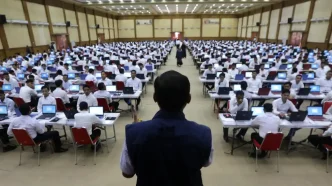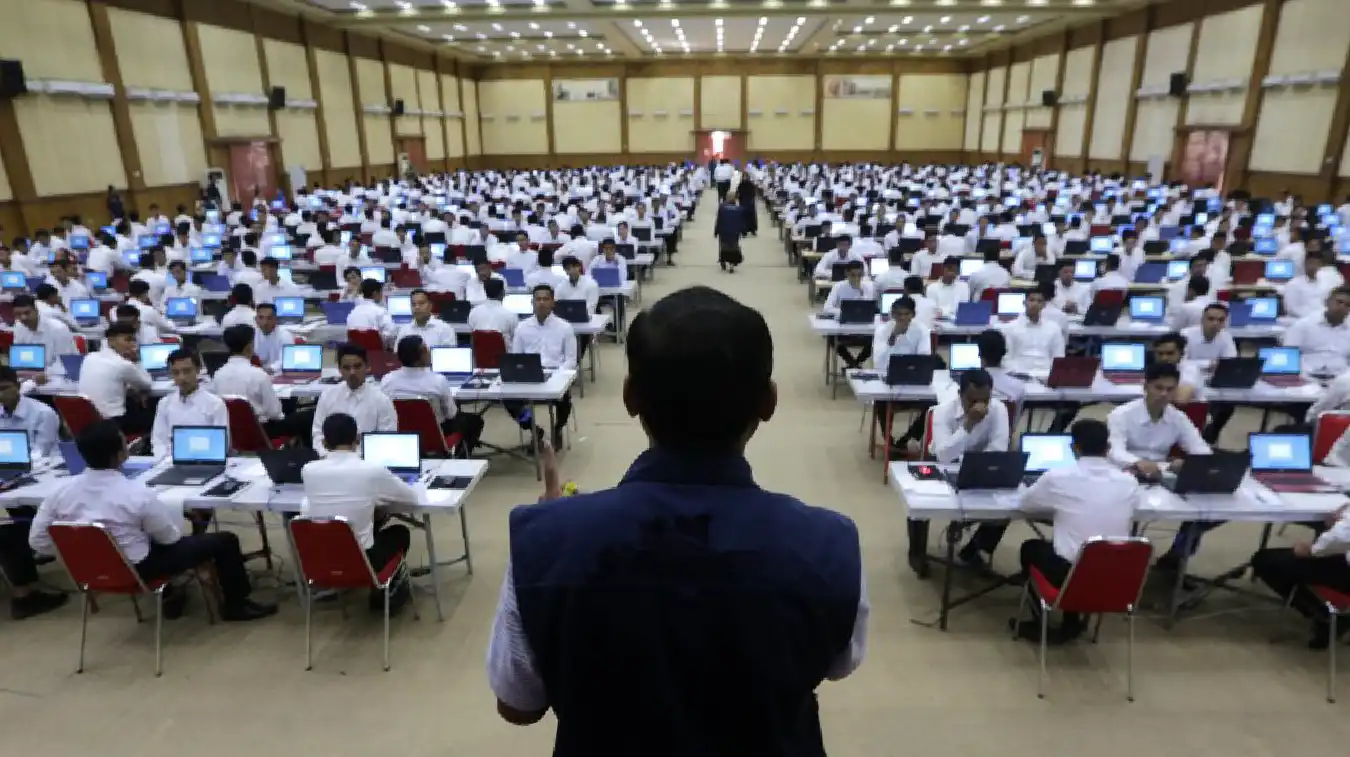Jakarta – This year’s computer-based entrance exam (UTBK) for Indonesia’s state universities has been overshadowed by allegations of widespread cheating and fraud, prompting authorities to vow strict action against perpetrators. The National Selection for New Student Admissions (SNPMB) Oversight Committee has uncovered hundreds of cheating incidents during the exam period, which ran from April 23 to May 3, 2025, with some cases serious enough to be referred to law enforcement.
Crackdown on Academic Dishonesty
At a press conference on Tuesday, Eduart Wolok, head of the SNPMB Oversight Committee, detailed the scale of the problem and the measures being taken to address it. “We’ve already imposed sanctions on those caught cheating and, in more serious cases, we have handed them over to the police” said Wolok. He stressed that oversight efforts would extend beyond the testing phase, continuing into the university re-registration period to ensure fairness.
The committee has introduced stringent preventive measures for this year’s UTBK, including the deployment of metal detectors at test centers and enhanced controls over test design, scoring procedures, and answer evaluation. “Thanks to the hard work of the committee and ongoing coordination with UTBK centers, we’ve been able to detect and address cheating attempts, protecting the integrity of the exam and the rights of honest participants” Wolok added.
Systemic Cheating Tactics Exposed
Investigations into this year’s UTBK have revealed a troubling array of organized cheating tactics. Among the most concerning is the use of so-called “academic joki,” paid test-takers hired to impersonate registered students. These individuals reportedly used forged documents, including test participant IDs, exam entry cards, and school enrollment certificates, to gain access to the exams.
In more sophisticated schemes, private tutoring centers have been implicated in facilitating fraud. Some centers allegedly bribed members of university IT teams to install remote-access software on exam computers, allowing third parties to complete the tests on behalf of registered candidates. Such tactics point to a deeper, systemic issue within the university admissions process, raising questions about the security of the testing infrastructure and the vulnerabilities exploited by organized groups.
Government Response and Public Concern
Higher Education, Science and Technology Minister Brian Yuliarto, who also spoke at the press conference, expressed strong support for the crackdown on cheating. “The number may be small, but academic dishonesty, no matter the scale, undermines students who have put in a genuine effort” Yuliarto stated. His comments reflect a broader concern among educators and policymakers about the long-term impact of such violations on Indonesia’s academic standards and the credibility of its higher education system.
Public reaction to the scandal has been one of frustration and disappointment. Many parents and students who prepared diligently for the UTBK feel cheated by the actions of a few. On social media platforms like X, users have voiced their anger, with some calling for harsher penalties for those involved in organized cheating schemes. Others have questioned whether the current system, despite the introduction of new security measures, is robust enough to prevent such incidents in the future.
Broader Implications for Indonesian Education
The cheating scandal comes at a time when Indonesia is striving to improve access to higher education and maintain the integrity of its academic institutions. State university admissions are highly competitive, with thousands of students vying for limited spots each year. The UTBK, designed to standardize the admissions process, is seen as a critical gateway to opportunity for many young Indonesians, particularly those from disadvantaged backgrounds who rely on merit-based selection to secure a place.
However, incidents of fraud and cheating threaten to erode trust in this system. Education experts warn that if left unchecked, such practices could perpetuate inequality by favoring those with the means to pay for illicit assistance over those who rely on hard work and talent. “This is not just about a few bad actors; it’s about ensuring that the system remains fair for everyone” said Dr. Anita Sari, an education policy analyst based in Jakarta. She argues that beyond punitive measures, the government must invest in long-term solutions, such as improving test security technology and increasing transparency in the admissions process.
Historical Context of Academic Fraud in Indonesia
Academic dishonesty is not a new phenomenon in Indonesia. Over the years, reports of cheating during national exams and university entrance tests have surfaced periodically, often linked to systemic issues such as inadequate oversight and socioeconomic pressures. In 2007, for instance, concerns were raised about the integrity of state university entrance exams when allegations of leaked test papers emerged. While the scale and methods of cheating have evolved with technology—moving from paper leaks to digital impersonation—the underlying challenges remain largely unaddressed.
The rise of digital tools has added a new layer of complexity to the problem. Remote-access software, forged digital IDs, and online networks of test-takers for hire have made it easier for organized groups to exploit weaknesses in the system. At the same time, the pressure on students to succeed in a highly competitive academic environment can drive some to resort to unethical means, particularly in a society where a university degree is often seen as a prerequisite for social mobility.
Comparative Perspective: Regional Challenges
Indonesia is not alone in grappling with academic fraud. Across Southeast Asia, countries like Vietnam and Thailand have faced similar issues during national exams, often involving organized cheating rings and corrupt officials. In Vietnam, a 2018 scandal saw dozens of students’ scores inflated through bribery, leading to widespread public outrage and calls for reform. In Thailand, reports of test paper leaks and impersonation during university entrance exams have also prompted authorities to tighten security measures.
These regional parallels suggest that academic dishonesty is a broader structural issue, tied to systemic inequalities and the high stakes associated with education. For Indonesia, learning from the experiences of its neighbors could provide valuable insights into effective countermeasures. For instance, Thailand’s adoption of biometric verification at test centers has been credited with reducing impersonation cases, though it comes with significant costs and privacy concerns.
Looking Ahead: Reforms and Challenges
As the SNPMB continues its investigations and imposes sanctions on those involved in this year’s cheating scandal, the focus is shifting toward prevention. Proposed reforms include the adoption of advanced proctoring technologies, such as AI-based monitoring systems that can detect suspicious behavior during exams. Additionally, there are calls for stricter regulations on private tutoring centers, which have been identified as key players in facilitating organized fraud.
However, implementing these changes will not be without challenges. Budget constraints, technological limitations, and the sheer scale of Indonesia’s student population—millions of whom participate in national exams each year—pose significant hurdles. Moreover, any reforms must balance the need for security with the protection of students’ rights and privacy, ensuring that measures like biometric scanning or digital monitoring do not disproportionately affect vulnerable groups.
Beyond technological solutions, there is a growing recognition of the need for cultural change within the education system. Educators and policymakers are advocating for initiatives that promote ethical behavior from an early age, such as integrating academic integrity into school curricula and providing support for students under pressure to succeed. “We need to address the root causes of cheating, not just the symptoms” said Dr. Sari, emphasizing the importance of fostering a culture of honesty and fairness.
A Test of Trust
As Indonesia moves forward from this year’s UTBK scandal, the stakes are high for both students and the education system as a whole. Restoring public confidence in the fairness of university admissions will require sustained effort and a commitment to addressing both immediate security gaps and deeper systemic issues. For now, the actions of the SNPMB and the government signal a willingness to confront the problem head-on, but whether these measures will be enough to prevent future scandals remains an open question.
For the thousands of honest students who sat the UTBK this year, the hope is that their hard work will not be overshadowed by the actions of a few. As reforms unfold, the integrity of Indonesia’s academic future hangs in the balance, with implications that extend far beyond the walls of examination halls.
















